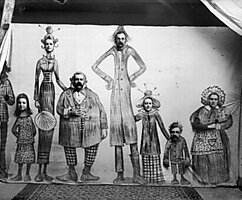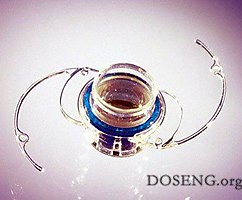5 secrets of the human race, that science still can not explain
 Bashny.Net
Bashny.Net
Simple voprosyPosle a couple of hundred thousand years razgulivaniya this large blue ball in decrepit shells of meat we pretty much found that is "to be a man." We know which side you need to eat, and how it then goes, and this, by and large, all that matters. No? Need more? You thought that we nowadays know everything about the human body, thanks to the amazing science? Of course, we know a lot, but there are some simple questions to which so far is not enough convincing answers. There is speculation, theories, hypotheses, but when it comes down to it, they do not explain anything.
1. What is pain? 18,470,753
pain - an unpleasant, but a universal human experience. This is one of the first things that we encounter in life, and this experience is likely to be one of the last.
But what exactly is the pain? How does it work? Do you feel the same as your neighbor? If both of you feel is the same, whether it is not unfair, because it deserves much worse? If you can not answer these questions, do not worry - the science, too, can not. All these wise scholars who are developing medicines for pain and prescribe them to you, can not even agree on what it is.
Perhaps the best way to demonstrate this - look at fibromyalgia, a disease that can be described as "It hurts everything." There are no physical tests that can confirm the presence of the disease in you - no brain scan or blood test or a seance no effect. How do doctors diagnose it? Well, you fill in the questionnaire: "Do you have pains in different parts of the body that doctors can not explain?" Huh? Boom: you have fibromyalgia. Or maybe demonic possession. Or aliens.
Doctors say that patients with fibromealgiey there are differences in brain scans, but they vary in different patients - no doctor can not see you in the skull and definitely say, you have the disease or not. If you absolutely honest, they have only recently begun to take the first steps in learning how to detect pain in the human brain.
Toru Wager, Associate Professor of Psychology and Neuroscience University of Colorado Boulder: "Now there is no clinically acceptable methods to measure pain and other emotions, but to ask the person how he feels».
A great way to really. And very scientific.
2. Why does anesthesia work? 62,295,809
Anesthesiology - truly a miracle of modern science, but think about what a terrible thing: with a few chemicals anesthesiologists take on and off certain parts of the brain. Too much - and you will never wake up. It is not enough - and if you will experience the past life as a soldier in the First World War to the operations conducted with a hacksaw. But what do these chemicals? As they interact with your body in this manner to achieve the necessary balance? Here's an honest answer: science does not know.
Basically, anesthesia developed over hundreds of years, in a simple manner: "This inflated the guy that's it, and see what happens. Still screaming? Well, try something from this. " Trial and error gave us a clear picture of what we can use to achieve the desired effect - anything from complex full of steroids to xenon light. But the question of why these substances are sent to your consciousness into sleep mode without completely disabling and the inscription "dead" next to the name, there is no clear answer.
The main reason for this lies in the fact that science does not know what "consciousness" and how it works. There is no definitive test that would show that people currently realize something - the best thing that can make anesthesiologists is to look for the presence of certain brain waves, physical reactions, and ... wait a minute ... sensitivity to pain. But, as we have already discussed, science has no way to determine whether you feel the pain, so it is entirely up to you - show them that you're not anesthetized.
And if you get it wrong, you do not worry: you will have a few hours to think about what else you could answer while you're locked inside your body motionless throughout the entire operation. Joke.
3. Why do we laugh? 81,137,838
Some scientists believe that laughter - a signal that the perceived threat is not real danger, while others argue that it is a reaction to an unexpected result. And still others think it's because Jim Carrey talks his fifth point, and that, as a rule, no one does.
All are to some extent correct, because no one knows for sure why we laugh. However, we know that laughter is more than any other emotional response affects all areas of the brain, including the motor. Even more surprising is the fact that most of the laughter has no relation to the comic situations. Studies have shown that less than 20% of laughter is the result of something funny. More often than not we laugh to accent innocuous statements to fill a pause in the conversation, or because an insidious plan to capture the universe began, finally, to fruition.
There is one thing that we (probably) know - how laughter arose, he appeared in a situation where the primates suffocated during a severe tickling. This of course leads to the inevitable question: "But why are we ticklish?", Which leads to the inevitable answer "The dog knows».
4. Why do we relate well to each other? 21,111,518
If in the days of hunter-gatherers, when the main thing was - to survive, you would have found in the midst of a huge forest Layer Cake, the last thing you would think - it is shared with others, because it is contrary to the instinct of survival. This is your cake, and you have beaten in the face of all those who tried to reach him with his thieving fingers.
Selfless acts of kindness were absolutely unprofitable: to pass on their genes, people looking for partners able to survive, while altruism is put on a man die evolutionary dead end as gills or tails.
So how altruism survive? You guessed it: Unknown.

Scientists are trying to discover the secret of altruism most of the last century. In the 1960s, George Price has even developed a complex mathematical equation about how altruism could survive. Price was so engrossed in his studies that need to invite strangers to live in his apartment until he hung up on his theorem, sitting in his office.
5. Why do some of us - left-hander? 74,041,951
About 90% of the population of our planet right-handed, the remaining 10%, respectively - left-hander. Such distortion is observed only in humans, while the other creatures in the animal kingdom divided about equally, if not show any preference.
Why are we so different? Obviously, with the brain in left-handers all right - they left hemisphere controls speech, as well as right-handers. In addition, the right-handed often dominates the left leg and vice versa, indicating that the preference does not apply to the rest of the body. Scientists have tried to find an answer to since all drew attention to the left-handers, but still it remains a mystery.
We know that left-handedness - a genetic trait, it means that the genes responsible for it must have a certain advantage to spread further. However, it is unclear what kind of benefit it could be. Since the overall percentage of left-handers is quite low, one would assume that we are seeing the last representatives with a sign, gradually disappear from the gene pool, but this is not the case: the study of prehistoric human settlements have shown that the percentage of left-handers was always almost the same.
Going beyond the left-handedness, the fact that we all have a dominant hand, and in many ways remains a mystery. In addition, the guys in the white coats have long puzzled over the overall asymmetry of the human anatomy: our heart on the one hand, our lungs differently arranged with respect to one another (left hangs lower than the right). While this phenomenon is observed in great apes, the human brain is most remarkable - it is wildly asymmetrical, and some scientists believe that this asymmetry could be the defining feature that makes us human.
via factroom.ru
1. What is pain? 18,470,753
pain - an unpleasant, but a universal human experience. This is one of the first things that we encounter in life, and this experience is likely to be one of the last.
But what exactly is the pain? How does it work? Do you feel the same as your neighbor? If both of you feel is the same, whether it is not unfair, because it deserves much worse? If you can not answer these questions, do not worry - the science, too, can not. All these wise scholars who are developing medicines for pain and prescribe them to you, can not even agree on what it is.
Perhaps the best way to demonstrate this - look at fibromyalgia, a disease that can be described as "It hurts everything." There are no physical tests that can confirm the presence of the disease in you - no brain scan or blood test or a seance no effect. How do doctors diagnose it? Well, you fill in the questionnaire: "Do you have pains in different parts of the body that doctors can not explain?" Huh? Boom: you have fibromyalgia. Or maybe demonic possession. Or aliens.
Doctors say that patients with fibromealgiey there are differences in brain scans, but they vary in different patients - no doctor can not see you in the skull and definitely say, you have the disease or not. If you absolutely honest, they have only recently begun to take the first steps in learning how to detect pain in the human brain.
Toru Wager, Associate Professor of Psychology and Neuroscience University of Colorado Boulder: "Now there is no clinically acceptable methods to measure pain and other emotions, but to ask the person how he feels».
A great way to really. And very scientific.
2. Why does anesthesia work? 62,295,809
Anesthesiology - truly a miracle of modern science, but think about what a terrible thing: with a few chemicals anesthesiologists take on and off certain parts of the brain. Too much - and you will never wake up. It is not enough - and if you will experience the past life as a soldier in the First World War to the operations conducted with a hacksaw. But what do these chemicals? As they interact with your body in this manner to achieve the necessary balance? Here's an honest answer: science does not know.
Basically, anesthesia developed over hundreds of years, in a simple manner: "This inflated the guy that's it, and see what happens. Still screaming? Well, try something from this. " Trial and error gave us a clear picture of what we can use to achieve the desired effect - anything from complex full of steroids to xenon light. But the question of why these substances are sent to your consciousness into sleep mode without completely disabling and the inscription "dead" next to the name, there is no clear answer.
The main reason for this lies in the fact that science does not know what "consciousness" and how it works. There is no definitive test that would show that people currently realize something - the best thing that can make anesthesiologists is to look for the presence of certain brain waves, physical reactions, and ... wait a minute ... sensitivity to pain. But, as we have already discussed, science has no way to determine whether you feel the pain, so it is entirely up to you - show them that you're not anesthetized.
And if you get it wrong, you do not worry: you will have a few hours to think about what else you could answer while you're locked inside your body motionless throughout the entire operation. Joke.
3. Why do we laugh? 81,137,838
Some scientists believe that laughter - a signal that the perceived threat is not real danger, while others argue that it is a reaction to an unexpected result. And still others think it's because Jim Carrey talks his fifth point, and that, as a rule, no one does.
All are to some extent correct, because no one knows for sure why we laugh. However, we know that laughter is more than any other emotional response affects all areas of the brain, including the motor. Even more surprising is the fact that most of the laughter has no relation to the comic situations. Studies have shown that less than 20% of laughter is the result of something funny. More often than not we laugh to accent innocuous statements to fill a pause in the conversation, or because an insidious plan to capture the universe began, finally, to fruition.
There is one thing that we (probably) know - how laughter arose, he appeared in a situation where the primates suffocated during a severe tickling. This of course leads to the inevitable question: "But why are we ticklish?", Which leads to the inevitable answer "The dog knows».
4. Why do we relate well to each other? 21,111,518
If in the days of hunter-gatherers, when the main thing was - to survive, you would have found in the midst of a huge forest Layer Cake, the last thing you would think - it is shared with others, because it is contrary to the instinct of survival. This is your cake, and you have beaten in the face of all those who tried to reach him with his thieving fingers.
Selfless acts of kindness were absolutely unprofitable: to pass on their genes, people looking for partners able to survive, while altruism is put on a man die evolutionary dead end as gills or tails.
So how altruism survive? You guessed it: Unknown.

Scientists are trying to discover the secret of altruism most of the last century. In the 1960s, George Price has even developed a complex mathematical equation about how altruism could survive. Price was so engrossed in his studies that need to invite strangers to live in his apartment until he hung up on his theorem, sitting in his office.
5. Why do some of us - left-hander? 74,041,951
About 90% of the population of our planet right-handed, the remaining 10%, respectively - left-hander. Such distortion is observed only in humans, while the other creatures in the animal kingdom divided about equally, if not show any preference.
Why are we so different? Obviously, with the brain in left-handers all right - they left hemisphere controls speech, as well as right-handers. In addition, the right-handed often dominates the left leg and vice versa, indicating that the preference does not apply to the rest of the body. Scientists have tried to find an answer to since all drew attention to the left-handers, but still it remains a mystery.
We know that left-handedness - a genetic trait, it means that the genes responsible for it must have a certain advantage to spread further. However, it is unclear what kind of benefit it could be. Since the overall percentage of left-handers is quite low, one would assume that we are seeing the last representatives with a sign, gradually disappear from the gene pool, but this is not the case: the study of prehistoric human settlements have shown that the percentage of left-handers was always almost the same.
Going beyond the left-handedness, the fact that we all have a dominant hand, and in many ways remains a mystery. In addition, the guys in the white coats have long puzzled over the overall asymmetry of the human anatomy: our heart on the one hand, our lungs differently arranged with respect to one another (left hangs lower than the right). While this phenomenon is observed in great apes, the human brain is most remarkable - it is wildly asymmetrical, and some scientists believe that this asymmetry could be the defining feature that makes us human.
via factroom.ru
Tags
See also
3 mysterious illness that doctors still can not explain
10 quick facts about the human body, that science still can not explain about
10 quick facts about the human body that science can not explain
10 important questions about the human body that we still don't know the answer
10 historical mysteries that we can not solve so far
Questions that science has not yet provided clear answers
Four absurd myth of psychology, all of which still believe
7 historical mysteries, which are all still scratching their heads
Mysteries of the universe that science cannot explain
Scientists still do not know why people hesitate, laughing, kissing and scratching his nose

















